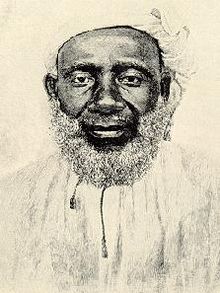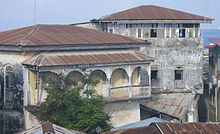Tippu tip
Tippu-Tip , west of the Congo Mutschi-Pula (also called Tippo Tip or Tupa-Tupa , * 1837 or 1838; † June 13, 1905 in Stone Town , Zanzibar ), with real name Hamed bin Juma bin Rajab bin Mohammed bin Said el -Murjebi , was an East African slave and ivory dealer . He supported numerous European explorers, worked at times for the Belgian royal family and the German Empire and was one of the most influential personalities in East Africa of his time.
Youth and start of activity as a trader
Tippu-Tip was the son of an Omani trader and an East African woman, the daughter of the ruler of Unyanyembe, Ifundikira. He began his career as a trader at the age of seventeen. In the course of his life he carried out several extensive expeditions to East and Central Africa . Partly by force of arms, partly through alliances with African rulers, he established a trading empire west of Lake Tanganyika in the 1860s . From 1874 he expanded the trading depot town of Nyangwe , founded by the Arabs, into his residence and the largest slave transhipment point in Central Africa. His armed entourage is said to have consisted of more than 10,000 people at times. It included slaves from all parts of East and Central Africa as well as traders from the East African coast.
Contacts with Europeans
He became known and later famous in Europe through his contacts with European explorers and leading colonial officials, including Henry Morton Stanley , Eduard Schnitzer , David Livingstone , Veney Cameron , Hermann von Wissmann and Wilhelm Junker , whom he supported on their research trips. He was an eyewitness to the historic meeting of Stanley and Livingstone in Ujiji in 1871 ( "Dr. Livingstone, I presume?" ). All Europeans described him as extremely courteous, educated, friendly and charismatic. In Zanzibar City he maintained good contacts with all diplomats accredited there. Stanley called him a black gentleman .
Governor on behalf of the Belgian Crown

After the independent Zanzibar in whose Sultan behalf he was traveling in 1886 his influence on the tanganikanischen mainland in favor of the East African German Society lost, he graduated in 1887 with Leopold II. An agreement that made him governor of the region around the Stanley Falls of Congo Free State made. This was accompanied by the ban on the slave trade, which he had to undertake to enforce. This agreement, threaded by British diplomats and with the blessing of the sultan, met with resistance from other influential traders who militarily resist the growing influence of the Congo Free State and who did not want to forego the slave trade. This resistance also broke the Tippoo-Tips agreement with the Free State after the death of Sultan Bargasch of Zanzibar. After 1891 he retired to Zanzibar. The Arabs who stayed behind went to war against the Congo Free State, which is under the Belgian crown . Within five years they were crushed by Leopold's troops. The trading empire fell apart.
Cooperation with German East Africa
Tippu-Tip played a certain role in the history of the colony of German East Africa . He supplied the German Schutztruppe with followers, many of whom were former slaves. He turned down the position offered to him by the German colonial authorities as governor of a province in western Tanganyika. His close cooperation with Wissmann, who used to justify German colonial rule by fighting the slave trade, only became known in Germany later.
author
Tippu Tip wrote or dictated his biography in Swahili in retirement in Zanzibar . It is the first example of this type of literature in the East African language.
- Tippu Tip, WH Whitely (transl.): Maisha ya Hamed bin Mohammed el Murjebi yaani Tippu Tip. Kwa maneno yake mwenyewe . (Languages: Swahili - English). Johari za Kiswahili, Volume 8, ZDB ID 411361-5 . (Reprint). Kampala (et al.), East Africa Literature Bureau 1974.
Death in Zanzibar
In 1905 he died of malaria in his home in Zanzibar City . His former home has been a listed building there since 1968; the interior cannot be visited.
literature
- Heinrich Brode: Tippu tip. Life picture of a Central African despot . Baensch, Berlin 1905. - Full text online .
- -, H. Havelock (transl.): Tippoo Tib. The Story of his Career in Central Africa . (Preface: Charles Eliot ). (English). Arnold, London 1907. - Full text online .
Individual evidence
- ^ Winfried Speitkamp : German Colonial History . Reclam, Stuttgart 2005, p. 58.
- ↑ Angela Downing: The autobiography of Hamed bin Muhamed el Murjebi, 'Tippu Tip' . In: Barcelona English Language and Literature Studies 1989, Vol. 1, pp. 61–70, here p. 62. - PDF online .
Web links
- Literature by and about Tippu-Tip in the catalog of the German National Library
- German Colonial Lexicon 1920
- Article The bloody trail of the Tippu Tip in the taz
| personal data | |
|---|---|
| SURNAME | Tippu tip |
| ALTERNATIVE NAMES | Hamed bin Juma bin Rajab bin Mohammed bin Said el-Murgebi |
| BRIEF DESCRIPTION | Arab slave and ivory dealer |
| DATE OF BIRTH | 1837 or 1838 |
| DATE OF DEATH | June 13, 1905 |
| Place of death | Stone Town , Zanzibar |

